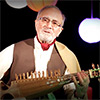
Mohammad Hossein Arman had an interest in music from childhood, especially since he grew up in a musical family. The first instruments such as Nai and Harmonia were provided by his older brother Mohammad Ebrahim Nasim. Already in 1951 he belonged to a group of young people, in Radio Kabul , today Radio Television Afghanistan (RTA), by masters of the Kabul Kharabat of the Patiala (city) - GharanaMusic school and the representatives of Western-oriented multi-voice music. Members of this group were Ustad Fakir Nangyaly (trumpet), Ustad Salim Sarmast, a famous Afghan conductor of the 20th century.
Ustad Arman learned the classical music in Kabul Kharabat with Ustad Ghulam Hossein , the father of Mohamed Hussein Sarahang . Faruch Afandi and Ustad Abdul Ghafur Breshna taught the music with Western tuned instruments on the Kabul radio. His preference was guitar, which he, apparently, was the first Afghan musician to play in a multi-voice (melody and chords).
Ustad Arman took his maturity examination at the commercial school in Kabul at the beginning of the 1950s and worked first with the national airline Ariana Afghan Airlines , a subsidiary of Pan American World Airways . Then he was busy with Radio Kabul . In 1966 he received a scholarship for music in Yugoslavia. He studied classical guitar in particular. In the seventies he returned to Kabul. There he composed several songs. His songs are still broadcast today by various TV stations.
Between the 1970s and 1990s, he worked with the Kabul Symphony, conducted by Prof. Salim Sarmast, and taught as a lecturer at the Kabul Conservatory. Renowned musicians from the country were members of this symphony orchestra. During the civil war in the 90s he left Afghanistan and emigrated to India. After that, he stayed in Germany before he finally settled in Switzerland.
Ustad Arman traveled to Kabul in 2011 to find out about the development of music in Afghanistan and, if necessary, to teach there. Ustad Arman would have, for example, Ahmad Sarmast (son of the only conductor of Afghanistan in the 20th century), and supported by the London Music School in Kabul. This music school was also supported by the Federal Foreign Office. Apparently, the son of Ustad Salim Sarmast showed no interest in making use of the experience of his father's colleague. The Afghan Ministry of Culture also showed him the cold shoulder. He returned disappointedly from Kabul and reported in Europe about his travel experience and that he was not enthusiastic about the development of the music.
His song "Eshq e tu Mekashanad" is very famous and is sung by various singers and singers, among others, by Freshta Sama, the younger sister of Hangama . Originally, the song was only played with the guitar
Ustad Arman's Albums

